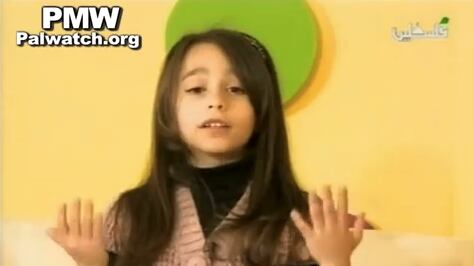Hate speech is always disturbing. But it’s never so disturbing as when it comes out as poetry, recited in perfect pentameter and gorgeous rhyme, by the most adorable little girls you could ever hope to find. As Palestinian Media Watch noted this week, official Palestinian Authority television has invited children to recite hate speech several times over the past few months. In the video below, two little girls recite a poem describing “sons of Zionists” as the “most evil among creations, barbaric monkeys, wretched pigs.” It insists that “Jerusalem is not [their] den.” It refers to them as “filth.”
Another poem makes reference to “Allah’s enemies, the sons of pigs.” It ends with the question, “Where is the fear of Allah in Jerusalem, which has been defiled by the Zionists?” Yet another one says that “our enemy, Zion, is Satan with a tail.”
Watching such dehumanizing and demonizing words come out of the mouths of children is disturbing, not because it’s a particularly new phenomenon—this kind of hate speech has been documented before—but because such videos are apt to refuel the debate over PA incitement that a groundbreaking research study on Palestinian and Israeli textbooks, released this February to significant media attention, had just begun to undercut.
The study, funded by the U.S. State Department and conducted by Israeli and Palestinian researchers, took the air out of an accusation frequently lobbed at the PA: that its textbooks brainwash Palestinian schoolchildren by inciting hatred against Jewish Israelis. The findings revealed that extreme dehumanizing and demonizing portrayals of the other are actually very rare in both Israeli and Palestinian schoolbooks, and that the Palestinian books are not nearly as bad as official Israel has spent years suggesting. While the study sparked pride and a sense of vindication in many Palestinians and their supporters (and annoyed the Israeli government to no end), videos like the ones mentioned above suggest that, unfortunately, the same positive appraisal can’t be extended to Palestinian TV.
And that’s a big problem. Not just because dehumanizing hate speech is morally condemnable (it is), but because, as Congress made clear in February, the PA promotes such speech at its own financial risk.
At the time, House Foreign Affairs chairman Rep. Ed Royce, together with the State Department, was working on making the release of over $500 million in frozen U.S. aid conditional on PA efforts to curb incitement and anti-Semitic activity. As a CQ Roll Call report noted:
“We tie it to the package in a way that allows the State Department to utilize this as a tool in order to end the incitement,” Royce said in an interview. “I would like to see some effort, some serious effort on the part of the Palestinian Authority to cease supporting this type of counterproductive activity because it makes reconciliation all the more difficult and creates conditions which are conducive to violence.”
When Royce made this statement back in February, voicing the usual concerns about both Palestinian textbooks and television, I noted his strange failure to remark on the positive developments the research study had documented with regard to PA textbooks. Then-PM Salam Fayyad’s demonstrated commitment to improving the Palestinian curriculum should have elicited praise—because, you know, credit where credit is due.
Unfortunately, catalogues like the one assembled by the Palestinian Media Watch this week show that the same cannot be said for Palestinian TV. Though the United States released the nearly $500 million in frozen funds back in March, it remains to be seen what impact this latest spate of televised hate speech will have on future U.S. aid. If Royce has his way, it may well come with a hefty price tag attached to it.






